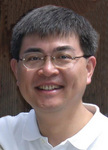Geng Xiao
Contributions to Fondad publications

After UCLA, Dr. Xiao joined the newly established Socialist Economies Reform Unit at the World Bank and worked closely with the Bank's leading economists Lawrence Summers, Alan Gelb, I.J. Singh and Andrew Sheng on China's economic reform. With valuable policy research experiences at the World Bank, Geng moved to the University of Hong Kong in 1992, joining then the School of Economics to pursue his interest in studying and helping China. In 1996, following a sabbatical visit to Harvard, Geng was appointed as a Faculty Associate at Harvard Institute for International Development, working with HIID's leading development economists Jeffrey Sachs, Dwight Perkins and Wing Thye Woo. From Winter 2000 to Summer 2003, Xiao Geng was seconded to the Securities and Futures Commission of Hong Kong as Adviser and Head of Research, contributing to the Commission's major policy research on the development and regulation of the securities markets in Hong Kong and the mainland China.
Dr. Xiao is one of the founders and the Deputy Director of the Institute for China and Global Development, a newly established cross-faculty research and training platform at the University of Hong Kong. He is also a member of the Asian Economic Panel, a regular policy research forum being held twice a year in U.S. and Asia and led by Jeffrey Sachs of the Earth Institute at Columbia University and other prominent economists in Asia.
Over the last decade, Dr. Xiao has done extensive empirical and policy research on China's enterprises and financial sector, making provocative, timely and useful recommendations for Beijing and Hong Kong authorities. Xiao Geng has also advised major international organizations such as UNDP and World Bank on China's economic reform and development. He has been invited frequently by academic, business, and governmental organizations around the world to give speeches and lectures on China. Xiao Geng has been frequently quoted by the local and international media and also writes for public policy journals such as the Asian Wall Street Journal, Far Eastern Economic Review, and Caijin Magazine (China).









